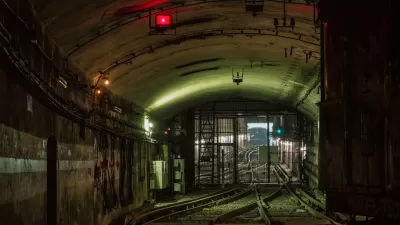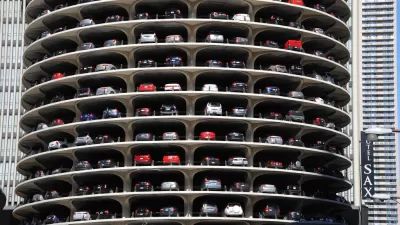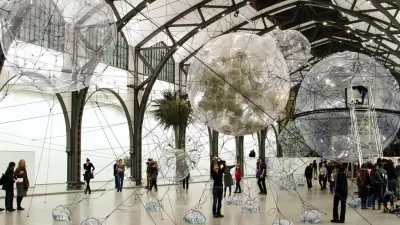Adaptive Reuse
Downtown Dallas' Comeback Story
Downtown Dallas provides another example of the redemptive power of adaptive reuse. With the number of empty buildings declining every year and more ambitious projects on the way, is it safe to say Downtown Dallas is all the way back?

Why Urban History Matters
Chuck Wolfe's recent reconnaissance of Edinburgh provides a foil for his rallying cry: Going forward, let’s not discount the influence of history’s recurring themes in how we redevelop the urban realm.

Reimagining Paris’s Derelict Métro Stations
Parisian mayoral candidate Nathalie Kosciusko-Morizet's proposal for the city’s abandoned train stations can be safely described as awesome. The designs are still a dream, but the city of lights is a good place for creative activity.
Pizza Hut and the Legacy of Corporate Architecture
For Americans growing up in the 1980s, the sight of a stand-alone restaurant with board-and-batten siding and a red-tile roof meant one thing: pizza ahead.
Future-Proofing Underground Condo Parking
Declining demand for zoning-mandated underground condominium parking has Toronto developers and architects talking about ways to design flexible sub-surface spaces to accommodate the possibility of alternate future uses.

Replacing Parking with People: The Next Wave of Adaptive Reuse
The trend towards less driving and auto ownership is causing designers to rethink the future of America's ever-growing supply of parking garages. Eric Jaffe explores what it means to design a garage with an eye towards a less car-dependent future.
St. Louis Takes a Farsighted Approach to Preserving Its Past
Recognizing the potential value of its historic homes and industrial buildings, but with few plans for reuse in the immediate future, the City of St. Louis is proposing to establish a preservation fund to mothball some of its 6,000 vacant buildings.
Reuse of Old Bridges Elevates Urban Living
Melanie D.G. Kaplan examines a growing trend in adaptive reuse—the transformation of old and underutilized bridges into elevated parks, walkways, and engines of economic development.
Building on Assets Creates a Better Buffalo
Low interest rates and incentives from the state are helping Buffalo, NY to leverage its waterfront and extraordinary architecture to create a vibrant downtown, with historic preservation and adaptive reuse projects at center stage.
14 Ways San Francisco Has Given New Life to Its Historic Assets
In the current feature story from its 'Urbanist' magazine, the Bay Area planning think tank SPUR looks at 14 efforts to preserve the soul of San Francisco through the adaptive reuse, incorporation and juxtaposition of the city's historic buildings.
Can St. Louis Keep Its Unique Heritage from Crumbling?
As the back-to-the-city movement takes hold, cities are turning old industrial buildings into distinctive spaces prized as offices and lofts. St. Louis is trying to figure out how to preserve their legacy assets from crumbling as they await new life.
Data Centers: The Next Trend in Adaptive Reuse?
Sears is planning to convert a number of its shuttered buildings into data centers. Could this become a trend for the reuse of vacant buildings nationwide?
Urban Ruins and the High Line Next Door
Chuck Wolfe suggests we all have the inspiration within us to envision how to remake our cities--from the conjecture of a Seattle restauranteur about Seattle's monorail to neighborhood examples of "we used this before, let's use it again".
Mill Makeover a Model for Discarded Manufacturing Relics
C.J. Hughes looks at the $40 million conversion of the historic Loray Mill in Gastonia, North Carolina into a mixed-use retail and residential complex. Federal and state tax credits are providing the incentives for investors to back the project.

10 Rail Stations on the Road to Recovery
As golden age of train travel came to an end, the fate of the world's train stations became unclear. But by utilizing their grand, flexible spaces, creative designers have found a variety of ways to keep the relics relevant.
A Model for How to Transform a Cherished Sports Landmark
The decade-long transformation of Toronto's historic Maple Leaf Gardens into a new centerpiece for its neighborhood may serve as a model for one of the trickiest types of adaptive reuse, reports Mark Byrnes.
From Housing Planes to People: Repurposing Success Stories
As cities across the world look to convert aging and obsolete airfields to new uses, a growing body of repurposing success stories show "how problematic properties can be successfully converted," reports Christine Negroni.
Detroit Struggles to Slake Thirst for Urban Living
In Detroit's downtown and midtown neighborhoods, 96 percent of rental apartments are occupied by young professionals, students and empty nesters. The city now faces the problem of meeting the high demand for urban living, reports Susan Stellin.
Unlocking Ideas for Re-Purposing America's Prisons
The good news - America is closing its prisons. The bad news - America is closing its prisons. Emily Badger asks how "all these empty, peculiar and often isolated buildings" can be reused.
'Block-Killing Blight' Remains a Stubborn Presence in Downtown L.A.
Despite the progress downtown L.A. has made over the last decade in becoming a vibrant, day-night, mixed-use community, "block-killing blight" remains a stubborn presence in the area's landscape. Ryan Vaillancourt calls out the worst offenders.
Pagination
Urban Design for Planners 1: Software Tools
This six-course series explores essential urban design concepts using open source software and equips planners with the tools they need to participate fully in the urban design process.
Planning for Universal Design
Learn the tools for implementing Universal Design in planning regulations.
Ada County Highway District
Clanton & Associates, Inc.
Jessamine County Fiscal Court
Institute for Housing and Urban Development Studies (IHS)
City of Grandview
Harvard GSD Executive Education
Toledo-Lucas County Plan Commissions
Salt Lake City
NYU Wagner Graduate School of Public Service


































